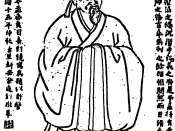The Lu Tsu-ch'ien Beginnings
In studding the Confucian Discourse it is apparent that the objectives of the book are to show the wide complex interactions of Twelfth century literati and how those interactions shaped the Confucian revival. In the past the focus of scholars has been to view Chu Hsi (1130-1200) as the central figure in a single line of development of neo-Confucian thought. As we have seen through are readings however this is simple not the case. Chu Hsi can be credited has being the mean or the center between philosophical extremes held by his contemporaries. He also with out a doubt was the largest compiler of commentaries on the classical canon. However being at the center of things does not mean that Chu Hsi was the model of Confucian thinkers. In fact there where many different viewpoints on Confucian thought in the Twelfth century and it is this wide variety of them that must be explored in order to understand the evolution of neo-Confucianism and Chu Hsi Ascendancy.
Chu Hsi may have been unique in his stances in that he sought to be in the middle. This was perhaps a strategic move on his part in order to gain leadership of the Tao-hsueh, a fellowship of Confucian literati. He did this in order to lesson the diversity of the group. He wished to centralize the fellowship and give it common focus. "Without a single center of authority, there was no clear standard for the larger fellowship" The very idea that Chu wanted to centralize the fellowship shows that there is a larger dialogue taking place.
It is this dialogue that must be at the very heart of the Confucian fellowship. It is also the area for which Confucian Discourse was written. Showing that in the past...


